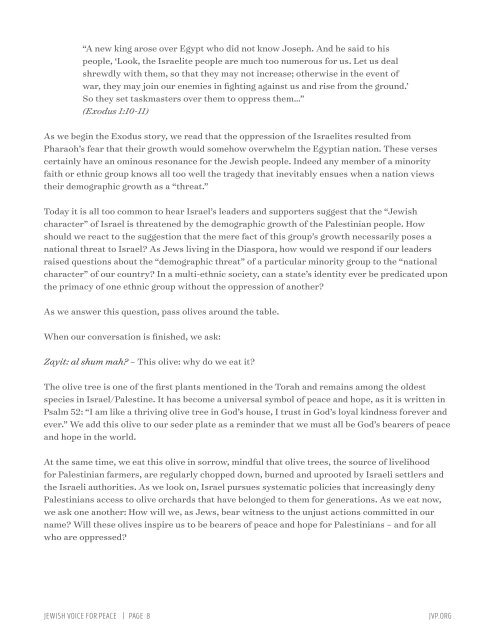5777-JVP-Haggadah-D9-final
5777-JVP-Haggadah-D9-final
5777-JVP-Haggadah-D9-final
Create successful ePaper yourself
Turn your PDF publications into a flip-book with our unique Google optimized e-Paper software.
“A new king arose over Egypt who did not know Joseph. And he said to his<br />
people, ‘Look, the Israelite people are much too numerous for us. Let us deal<br />
shrewdly with them, so that they may not increase; otherwise in the event of<br />
war, they may join our enemies in fighting against us and rise from the ground.’<br />
So they set taskmasters over them to oppress them…”<br />
(Exodus 1:10-11)<br />
As we begin the Exodus story, we read that the oppression of the Israelites resulted from<br />
Pharaoh’s fear that their growth would somehow overwhelm the Egyptian nation. These verses<br />
certainly have an ominous resonance for the Jewish people. Indeed any member of a minority<br />
faith or ethnic group knows all too well the tragedy that inevitably ensues when a nation views<br />
their demographic growth as a “threat.”<br />
Today it is all too common to hear Israel’s leaders and supporters suggest that the “Jewish<br />
character” of Israel is threatened by the demographic growth of the Palestinian people. How<br />
should we react to the suggestion that the mere fact of this group’s growth necessarily poses a<br />
national threat to Israel? As Jews living in the Diaspora, how would we respond if our leaders<br />
raised questions about the “demographic threat” of a particular minority group to the “national<br />
character” of our country? In a multi-ethnic society, can a state’s identity ever be predicated upon<br />
the primacy of one ethnic group without the oppression of another?<br />
As we answer this question, pass olives around the table.<br />
When our conversation is finished, we ask:<br />
Zayit: al shum mah? – This olive: why do we eat it?<br />
The olive tree is one of the first plants mentioned in the Torah and remains among the oldest<br />
species in Israel/Palestine. It has become a universal symbol of peace and hope, as it is written in<br />
Psalm 52: “I am like a thriving olive tree in God’s house, I trust in God’s loyal kindness forever and<br />
ever.” We add this olive to our seder plate as a reminder that we must all be God’s bearers of peace<br />
and hope in the world.<br />
At the same time, we eat this olive in sorrow, mindful that olive trees, the source of livelihood<br />
for Palestinian farmers, are regularly chopped down, burned and uprooted by Israeli settlers and<br />
the Israeli authorities. As we look on, Israel pursues systematic policies that increasingly deny<br />
Palestinians access to olive orchards that have belonged to them for generations. As we eat now,<br />
we ask one another: How will we, as Jews, bear witness to the unjust actions committed in our<br />
name? Will these olives inspire us to be bearers of peace and hope for Palestinians – and for all<br />
who are oppressed?<br />
Jewish voice for peace | Page 8 jvp.org


